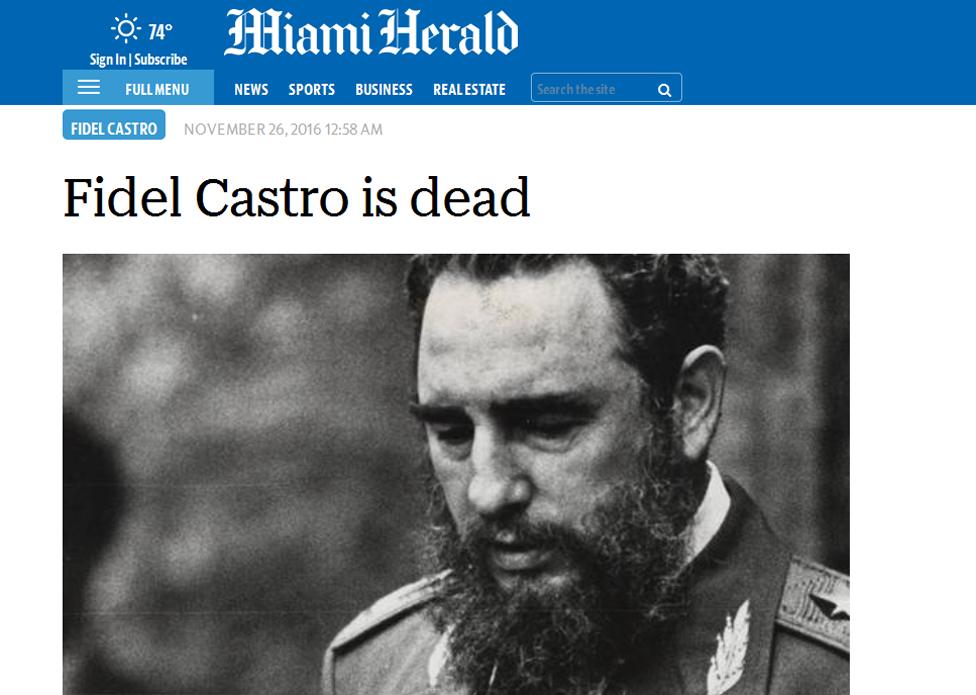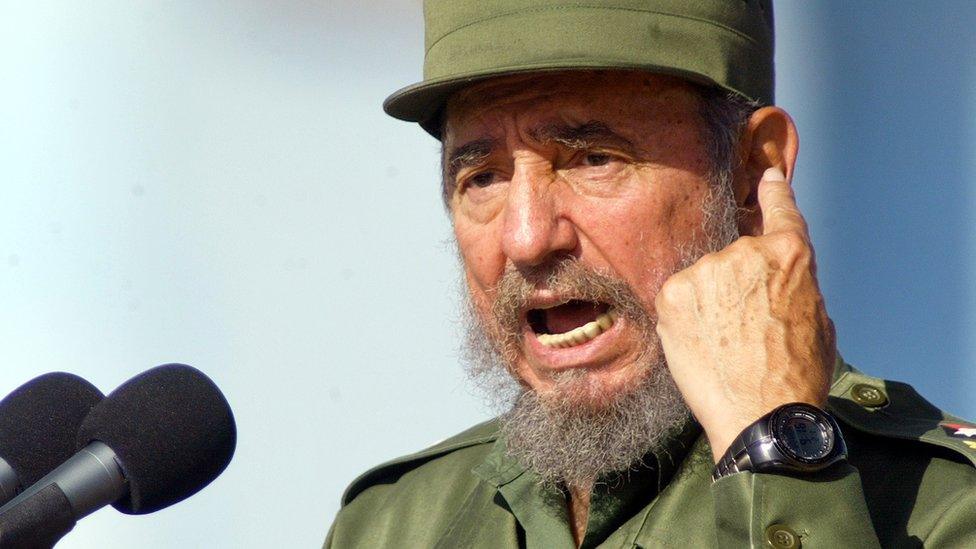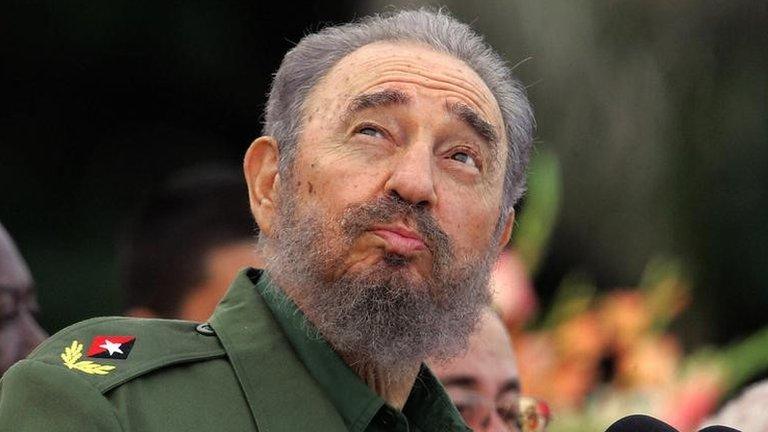Fidel Castro: World's media digests a divisive legacy
- Published

The Cuban media hailed the life of their "hurricane chaser" former president
"This is not a goodbye, but a farewell".
Cuba's Communist youth newspaper Juventud Rebelde invoked the lyrics of the Cuban revolutionary anthem Hasta Siempre in its tributes to late President Fidel Castro.
The paper describes him as a "hurricane chaser" whose achievements in life were "evidence of the possible".
The rest of Cuba's tightly-controlled media took a similar line. The Communist party newspaper Granma hailed Castro's "discipline, loyalty and courage" while Radio Reloj called him a "symbol of humanity".
The Cubadebate, external website said: "We will always love you, as well as defend the revolution that you sparked."

Elsewhere in the world there is a greater divergence of opinion on Castro's legacy, although there is little doubt about his impact on history.
Revolutionary
Argentina's Clarin, external calls him "a major revolutionary... and one of the protagonists of the 20th century", while Mexico's Jornada, external says he "will remain one of the leaders who will be most remembered and analysed".
Nicaragua's El Nuevo Diario, external says: "He was both admired as a revolutionary myth and accused of being a dictator but even his enemies acknowledged his charisma and leadership skills.
"No-one stayed indifferent to his controversial personality," it concludes.
Russia's state-controlled Channel One TV says Castro "symbolised a whole era and was one of the most striking politicians in the world, irrespective of what one may think of his politics".
Russia's NTV says: "The longest Latin American soap opera has drawn to a close. And its main character, true to the laws of drama, left the stage undefeated."
Algerian State TV said Castro was "characterised by his humanity" and noted that his last TV appearance occurred during the Algerian prime minister's visit to Havana.
In Germany's Die Welt, Cuban migrant Carlos Alberto Montaner says Castro turned from "revolutionary to disillusionist... his dream remained to a large extent a dream".
Tyrant
Many media outlets in Western Europe are quick to point out that Castro was no hero. Spain's ABC calls him "a cheating tyrant," saying: "He served Marxism to impose a totalitarian regime that brought Cuba to the brink of economic collapse."
"With the tyrant's death, a historic chance arrives to take on a true political and economic U-turn," it concludes.
Italy's Corriere della Sera details the history of Cuba under Castro with the headline "from utopia to torture" .
Writing in Germany's Stern, external magazine, Conrad Schuhler describes the "death of an immortal" .
"He survived so many assassination attempts that he did not believe in his death any more. Now Fidel Castro - one of the last political dinosaurs of the Cold War - has died," Schuhler writes.

German website Stern noted the many attempts on Mr Castro's life
Leader who challenged America
Palestinian author Murid al-Barghouthi tweets, external: "Goodbye Fidel Castro. He protected his revolution until the last day in his life. A small country managed to stand up to the biggest imperialist country."
Qatari-owned Al-Jazeera airs a video report saying: "Controversy over Castro will not end even after his death. He will be remembered forever as the leader who challenged America until the last day of his life."
Russia's state-run Rossiya 1 says: "A charismatic Fidel Castro... became a symbol of opposition to American imperialism... To his last days, Fidel Castro fought to make sure that even after his death, Cuba remained true to the ideals of social justice."
China's state-run Global Times says: "During and after the Cold War, the US waged wars against smaller and weaker countries in Latin America and in the rest of the world.
"It has toppled regimes in many countries, but not Cuba.... In the end, the Obama administration gave in, extended an olive branch and restored bilateral ties. This proves Castro to be an outstanding strategist."
The view from America
The Miami Herald, external says that Castro's legacy had already faded before his passing.
"Few fired the hearts of the world's restless youth as Castro did when he was young, and few seemed so irrelevant as Castro when he was old — the last Communist, railing on the empty, decrepit street corner that Cuba became under his rule," it says.

"No one is sure if the force of the revolution will dissipate without Mr. Castro.," says the New York Times, external.
"But Fidel Castro's impact on Latin America and the Western Hemisphere has the earmarks of lasting indefinitely. The power of his personality remains inescapable, for better or worse."
BBC Monitoring, external reports and analyses news from TV, radio, web and print media around the world. You can follow BBC Monitoring on Twitter , externaland Facebook, external.
- Published26 November 2016

- Published26 November 2016

- Published26 November 2016